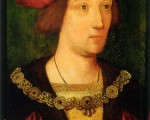
On this day in Tudor history events for week 19th to 25th September.
[Read More...]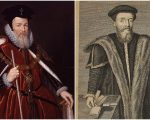
On this day in history, 13th September 1520, William Cecil, 1st Baron Burghley and Elizabeth I’s chief advisor, was born Bourne in Lincolnshire. He was the son of Richard Cecil, former Groom of the Robes, Constable of Warwick Castle and High Sheriff of Rutland, and his wife Jane Heckington. His grandfather, David Cecil, had been one of Henry VIII’s favourites, and was High Sheriff of Nottingham.
[Read More...]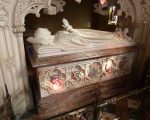
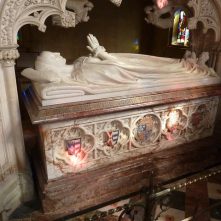
Catherine Parr's tomb
1548 - Catherine Parr, Queen Dowager, wife of Thomas Seymour and widow of Henry VIII, died aged around 36 at Sudeley Castle. She had given birth to her first child, a daughter Mary, on 30th August, but within a few days of the birth, she had contracted puerperal fever. You can read an article about her burial on the Anne Boleyn Files - click here - and you can read Catherine Parr related articles on the Tudor Society by clicking here.
1558 (5th or 6th September) – Death of Sir Robert Broke, judge, legal writer and Speaker of the House of Commons, at a friend's house in Patshull, Staffordshire. He was buried in Claverley Church, Shropshire. Broke also served as Deputy Chief Steward for the Duchy of Lancaster, Serjeant-at-Law and Chief Justice of the Common Pleas.
1569 – Death of Edmund Bonner, Bishop of London and a man nicknamed “Bloody Bonner”, in Marshalsea Prison. He was buried at St George's, Southwark, but it is thought that his remains were later moved to Copford, near Colchester, a manor held by Bonner as Bishop of London. In Mary I's reign, he was in charge of burning reformers in London, hence his nickname “Bloody Bonner”. Bonner was imprisoned in Elizabeth I's reign for refusing to follow the “Book of Common Prayer” in his services, and for refusing to take the “Oath of Supremacy”.
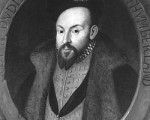
On 22nd August 1553, John Dudley, Earl of Warwick and Duke of Northumberland, was beheaded on Tower Hill for his part in putting his daughter-in-law, Lady Jane Grey, on the throne in place of Mary I. Northumberland’s friends, Sir John Gates and Sir Thomas Palmer, were also executed on this day in 1553 for supporting Northumberland.
[Read More...]
In today’s Claire Chats video I discuss whether Lady Jane Grey should actually be called Queen Jane.
[Read More...]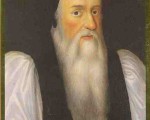
On this day in history, 2nd July 1489, one of my favourite Tudor personalities, Archbishop Thomas Cranmer, was born in Aslockton, Nottinghamshire.
Cranmer had a major impact on Tudor England. Not only did he provide Henry VIII with the annulment of his first marriage to Catherine of Aragon, he was also a key player in the English Reformation, and, of course, he was burnt at the stake for his faith in the reign of Queen Mary I.
[Read More...]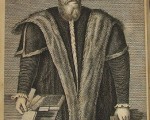
Today is the anniversary of the birth of Sir John Cheke, the English classical scholar and statesman. He was born on 16th June 1514 and was the son of Peter Cheke, bedel of the University of Cambridge. Sir John Cheke was educated at St John’s College, Cambridge, and became a fellow of the college in 1529. He became the first Regius Professor of Greek at the university in 1540 and taught William Cecil, Baron Burghley, and Roger Ascham, the English scholar and Princess Elizabeth’s tutor.
[Read More...]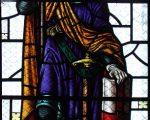
23rd April is the feast day of St George, who we know today as the patron saint of England. It is the traditional date given for his execution in 303 AD. St George was a Roman soldier who was imprisoned, tortured and beheaded for his Christian faith after he protested against the persecution of Christians.
[Read More...]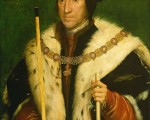
Thomas Howard was the eldest son of Thomas Howard, 2nd Duke of Norfolk, and of Elizabeth Tilney. He was the brother of Elizabeth Boleyn (née Howard) and Edmund Howard so was uncle to Queens Anne Boleyn and Catherine Howard. Howard’s father and grandfather had fought on Richard III’s side at the Battle of Bosworth but Howard was able to work his way back into royal favour by fighting for the Crown against both the Cornish rebels and the Scots in 1497. He was made a Knight of the Garter in 1510, was created Earl of Surrey in 1514 and succeeded his father as Duke of Norfolk in 1524. In September 1514 he was prominent in leading the English army in defeating the Scots at the Battle of Flodden.
[Read More...]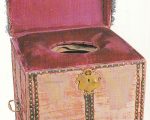
The Groom of the Stool, or, as the official title was known, The Groom of the King’s Close Stool, has gone down in history as one of the grossest jobs available. As the name suggests the Groom of the Stool was responsible for attending to the King’s toileting needs. The Groom would care for the King’s toilet, known in the Tudor period as a ‘Stool’. He would be responsible for supplying water, towels and a washbowl for the King when he had finished his business. There is some debate as to whether or not the Groom of the Stool was responsible for wiping the King’s behind, with some believing he did and others thinking his duties did not extend to that extreme.
While being responsible for the King’s bodily functions may seem quite disgusting for us in today’s times when going to the bathroom is considered to be a private matter, it was very, very different in the Tudor age.
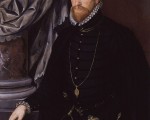
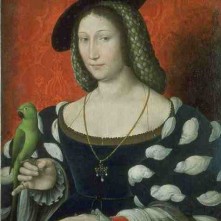
Marguerite de Navarre
1492 – Birth of Marguerite de Navarre (also known as Marguerite of Angoulême and Marguerite de France), sister of Francis I of France, daughter of Louise of Savoy and Charles, Count of Angoulême, and author of "Miroir de l'âme pécheresse".
1533 – The Royal Council was ordered by Henry VIII to recognise Anne Boleyn as Queen.
1548 – Death of Sir John Welsbourne, Gentleman of the Privy Chamber to Henry VIII and Justice of the Peace.
1554 - Sir Thomas Wyatt the Younger was beheaded and then his body quartered for treason, for leading Wyatt's Rebellion against Queen Mary I.
1609 - Death of John Lumley, 1st Baron Lumley, conspirator (Ridolfi Plot, patron and collector. His library was said to be one of the largest in England, and he collected manuscripts, books, paintings, sculptures, marble busts and furniture. Lumley was buried at night, probably so that he could be buried with a Catholic service, in the Lumley Chapel of St Dunstan's in Cheam.
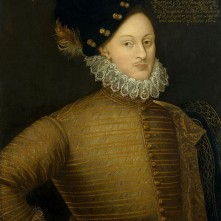
Edward de Vere
1533 – Thomas Cromwell became Chancellor of the Exchequer.
1533 - Anne Boleyn attended mass on Easter Saturday “with all the pomp of a Queen, clad in cloth of gold, and loaded (carga) with the richest jewels”. It was her first public appearance as Queen, and it was time to make a statement that she was Henry VIII’s rightful wife and Queen.
1535 – Death of Giles Duwes (Dewes), musician, royal librarian and French tutor to Henry VIII's children: Arthur, Henry, Margaret and Mary, and to Henry VIII's daughter, the future Mary I. He also taught Mary I music. He was buried in the church of St Olave Upwell in London.
1550 – Birth of Edward de Vere, 17th Earl of Oxford, courtier and poet. The Oxfordian theory of Shakespearean authorship proposes that de Vere wrote Shakespeare's works and some believe that he was the illegitimate son of Elizabeth I.
1587 – Death of Sir Thomas Bromley, Lord Chancellor to Elizabeth I, at York House in London. He was buried in Westminster Abbey. It was Bromley who had presented Elizabeth I with Parliament's petition for the execution of Mary, Queen of Scots, and it was he who applied the Great Seal on her execution warrant in 1587.
1639 – Death of courtier Robert Carey, 1st Earl of Monmouth, youngest son of Henry Carey, 1st Baron Hunsdon, and grandson of Mary Boleyn.
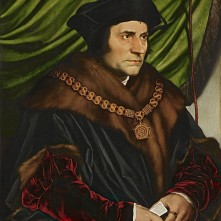
Sir Thomas More
1534 – Sir Thomas More was summoned to Lambeth to swear his allegiance to the “Act of Succession”.
1557 – Death of John Brydges, 1st Baron Chandos of Sudeley, landowner, soldier and Lieutenant of the Tower of London. He died at Sudeley Castle. When Lady Jane Grey was in the Tower, she gave him her English prayer book in which she wrote a homily for him, and when Elizabeth was in the Tower, he was accused of being too lenient with her.
1598 – Henry IV of France issued the Edict of Nantes granting the Huguenots freedom of religion in France.
1606 – Death of Richard Day, Church of England clergyman, printer and son of the famous printer John Day, who had printed John Foxe's “Actes and Monuments”. In 1578 Richard printed his own translation of “Christ Jesus Triumphant” by Foxe, and then got into trouble with his father when he started printing his father's works without his permission. His father had his printing equipment and stock seized, and Richard was forced to become a clergyman, becoming Vicar of Mundon, Essex.
1630 – Death of Anne Howard (née Dacre), Countess of Arundel, at Shifnal. She was laid to rest in the Fitzalan Chapel of Arundel Castle. Anne was the eldest daughter of Thomas Dacre, 4th Lord Dacre of Gilsand, and wife of Philip Howard, 13th Earl of Arundel. Anne was a staunch Catholic and harboured priests.
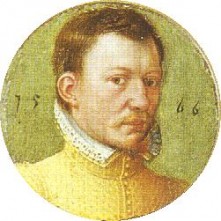
Bothwell
1556 – Death of Sir Anthony Kingston, former Constable of the Tower of London, at Cirencester while on his way to be tried in London. He was accused of conspiring to rob the Exchequer for money to support Henry Dudley and his plot against Mary I. Dudley appears to have been planning an invasion of English exiles from France to topple Mary and replace her with Elizabeth.
1565 – Birth of Edward Gresham, astrologer, astronomer and magician, in Stainsford, Yorkshire. He is known for his treatise “Astrostereon” and his astrological almanacs, published between 1603 and 1607.
1578 - James Hepburn, 1st Duke of Orkney and 4th Earl of Bothwell, died aged forty-four at Dragsholm Castle after being imprisoned and held in appalling conditions by Frederick, King of Denmark. It is said that the imprisonment caused Bothwell to go insane. Bothwell was the third husband of Mary, Queen of Scots.
1587 – Death of Edward Manners, 3rd Earl of Rutland, at Greenwich. He'd been taken ill earlier that month. He was buried on 15th May at Bottesford, Leicestershire.
1599 – Death of Sir Henry Wallop, member of Parliament and administrator, in Dublin while serving there as Treasurer-at-War. He was buried in St Patrick's Cathedral, Dublin.
1530 – Death of Gilbert Tailboys, 1st Baron Tailboys and first husband of Elizabeth (Bessie Blount), mistress of Henry VIII. He was laid to rest in South Kyme Church.
1545 – Death of Sir Robert Dymoke, champion at the coronations of Henry VII and Henry VIII. He also served in the households of Catherine of Aragon and Anne Boleyn.
1589 – Burial of Frances Radcliffe (née Sidney), Countess of Sussex and founder of Sidney Sussex College, Cambridge. She was buried in Westminster Abbey, in the Chapel of St Paul.
1599 – Robert Devereux, 2nd Earl of Essex, was sworn in as Lord Lieutenant of Ireland.
1624 – Burial of Sir John Scudamore, husband of Mary Shelton, who served in Elizabeth I's Privy Chamber, at Holme Lacy. It was alleged that Elizabeth I broke one of Mary's fingers in a temper.
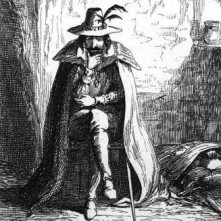
Guy Fawkes
1512 – The Mary Rose began her first tour of duty in the English Channel on the hunt for French warships.
1521 – German Protestant reformer, Martin Luther, appeared in front of Emperor Charles V at the Diet of Worms. He had been summoned to the diet to either recant or reaffirm his religious views.
1550 – Birth of Francis Anthony, alchemist, apothecary and physician. He was probably born in London and was the son of Derrick Anthony, a goldsmith. Anthony was imprisoned twice for practising as a physician without a licence, and is known for his aurum potabile (drinkable gold), made from gold and mercury, which he claimed had amazing curative powers. His works included Medicinae chymicae et veri potabilis auri assertio (1610).
1570 - Baptism of Guy Fawkes, conspirator, at the Church of St Michael le Belfrey in York.
1578 – Burial of Thomas Drant, Church of England clergyman and poet. He was part of the “Areopagus” intellectual circle at court, but also had an ecclesiastical career and was chaplain to Edmund Grindal, Bishop of London. He is known for his work on prosody (metre), and actually drew up some rules concerning it, which were mentioned by Edmund Spenser, Gabriel Harvey, Philip Sidney, Edward Dyer and Fulke Greville.
1587 – Death of Anne Seymour (née Stanhope), Duchess of Somerset and wife of Edward Seymour, Duke of Somerset and Lord Protector during part of Edward VI's reign. Anne was a reformer and a literary patron. She died at Hanworth Place and was buried at Westminster Abbey.
1595 – Death of Ferdinando Stanley, 5th Earl of Derby and literary patron. His sudden death caused rumours of poisoning and witchcraft, but nothing was ever proved. Stanley was patron of the Strange's Men company of players, which probably included William Shakespeare, and he was also a patron of poets. It is thought that he also was a poet.
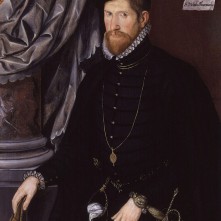
Nicholas Throckmorton
1534 - Sir Thomas More, Henry VIII's Lord Chancellor, was sent to the Tower of London after refusing to swear the “Oath of Succession”.
1554 – Sir Nicholas Throckmorton was acquitted of treason for being involved in Wyatt's Rebellion. The jurors were arrested straight after the trial and Throckmorton remained in prison until January 1555.
1554 – Thomas Wyatt the Younger's head was stolen in the rejoicing after Throckmorton's acquittal.
1554 – Birth of Stephen Gosson, Church of England clergyman, satirist and anti-theatrical polemicist. In 1579 he published his “Schoole of Abuse, containing a pleasant invective against Poets, Pipers, Plaiers, Jesters and such like Caterpillars of the Commonwealth”.
1568 – Birth of George Brooke, conspirator, son of William Brooke, 10th Baron Cobham and his wife Frances (née Newton). Brooke conspired with Sir Griffin Markham and William Watson to kidnap King James I and end the persecution of Catholics. The plot was called the Bye Plot, and never took place because the authorities found out about their plans. Brooke was arrested, tried at Winchester 15th November 1603 and executed on Winchester Castle green 5th December 1603.
1595 – Execution of Henry Walpole (St Henry Walpole), Jesuit martyr, in York. He was hanged, drawn and quartered. He was accused of treason on three counts "Walpole had abjured the realm without licence; that he had received holy orders overseas; and that he had returned to England as a Jesuit priest to exercise his priestly functions".